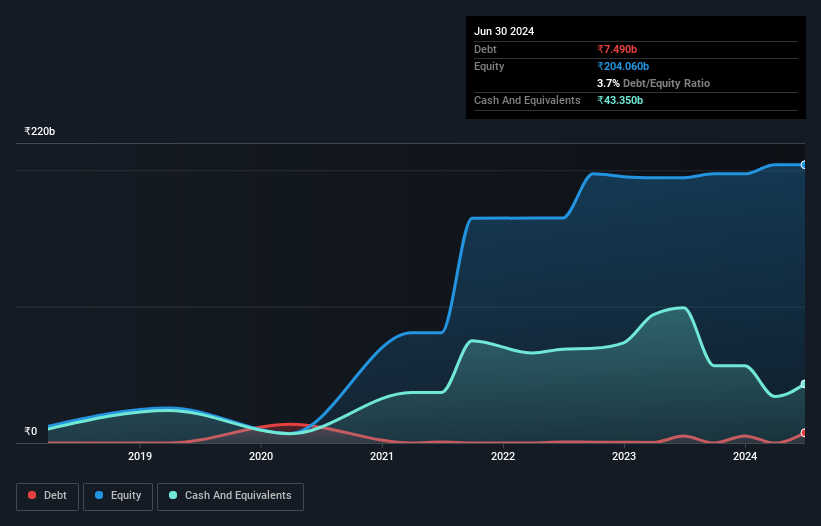David Iben put it well when he said, 'Volatility is not a risk we care about. What we care about is avoiding the permanent loss of capital.' So it seems the smart money knows that debt - which is usually involved in bankruptcies - is a very important factor, when you assess how risky a company is. We note that Zomato Limited (NSE:ZOMATO) does have debt on its balance sheet. But is this debt a concern to shareholders?
When Is Debt A Problem?
Debt and other liabilities become risky for a business when it cannot easily fulfill those obligations, either with free cash flow or by raising capital at an attractive price. If things get really bad, the lenders can take control of the business. However, a more frequent (but still costly) occurrence is where a company must issue shares at bargain-basement prices, permanently diluting shareholders, just to shore up its balance sheet. By replacing dilution, though, debt can be an extremely good tool for businesses that need capital to invest in growth at high rates of return. The first thing to do when considering how much debt a business uses is to look at its cash and debt together.
See our latest analysis for Zomato
What Is Zomato's Debt?
You can click the graphic below for the historical numbers, but it shows that as of March 2024 Zomato had ₹7.49b of debt, an increase on ₹5.07b, over one year. However, its balance sheet shows it holds ₹43.4b in cash, so it actually has ₹35.9b net cash.

How Healthy Is Zomato's Balance Sheet?
The latest balance sheet data shows that Zomato had liabilities of ₹20.8b due within a year, and liabilities of ₹8.67b falling due after that. Offsetting this, it had ₹43.4b in cash and ₹16.7b in receivables that were due within 12 months. So it can boast ₹30.5b more liquid assets than total liabilities.
This state of affairs indicates that Zomato's balance sheet looks quite solid, as its total liabilities are just about equal to its liquid assets. So while it's hard to imagine that the ₹2.26t company is struggling for cash, we still think it's worth monitoring its balance sheet. Simply put, the fact that Zomato has more cash than debt is arguably a good indication that it can manage its debt safely. The balance sheet is clearly the area to focus on when you are analysing debt. But it is future earnings, more than anything, that will determine Zomato's ability to maintain a healthy balance sheet going forward. So if you want to see what the professionals think, you might find this free report on analyst profit forecasts to be interesting.
Over 12 months, Zomato reported revenue of ₹139b, which is a gain of 72%, although it did not report any earnings before interest and tax. With any luck the company will be able to grow its way to profitability.
So How Risky Is Zomato?
While Zomato lost money on an earnings before interest and tax (EBIT) level, it actually booked a paper profit of ₹6.0b. So taking that on face value, and considering the cash, we don't think its very risky in the near term. We think its revenue growth of 72% is a good sign. We'd see further strong growth as an optimistic indication. There's no doubt that we learn most about debt from the balance sheet. However, not all investment risk resides within the balance sheet - far from it. We've identified 1 warning sign with Zomato , and understanding them should be part of your investment process.
If, after all that, you're more interested in a fast growing company with a rock-solid balance sheet, then check out our list of net cash growth stocks without delay.
Valuation is complex, but we're here to simplify it.
Discover if Eternal might be undervalued or overvalued with our detailed analysis, featuring fair value estimates, potential risks, dividends, insider trades, and its financial condition.
Access Free AnalysisHave feedback on this article? Concerned about the content? Get in touch with us directly. Alternatively, email editorial-team (at) simplywallst.com.
This article by Simply Wall St is general in nature. We provide commentary based on historical data and analyst forecasts only using an unbiased methodology and our articles are not intended to be financial advice. It does not constitute a recommendation to buy or sell any stock, and does not take account of your objectives, or your financial situation. We aim to bring you long-term focused analysis driven by fundamental data. Note that our analysis may not factor in the latest price-sensitive company announcements or qualitative material. Simply Wall St has no position in any stocks mentioned.
About NSEI:ETERNAL
Eternal
Provides e-commerce platform services to restaurant partners, quick commerce merchants, delivery partners, theatres, and event organisers in India and internationally.
Flawless balance sheet with high growth potential.
Similar Companies
Market Insights
Community Narratives



